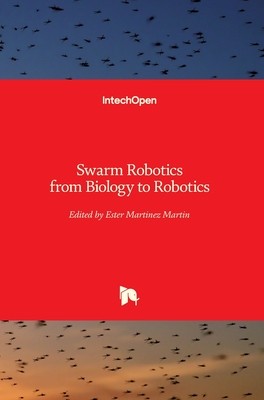
- We will send in 10–14 business days.
- Publisher: IntechOpen
- ISBN-10: 9533070757
- ISBN-13: 9789533070759
- Format: 17 x 24.4 x 0.8 cm, hardcover
- Language: English
- SAVE -10% with code: EXTRA
Swarm Robotics (e-book) (used book) | bookbook.eu
Reviews
Description
In nature, it is possible to observe a cooperative behaviour in all animals, since, according to Charles Darwin's theory, every being, from ants to human beings, form groups in which most individuals work for the common good. However, although study of dozens of social species has been done for a century, details of how and why cooperation evolved remain to be worked out. Actually, cooperative behaviour has been studied from different points of view. Swarm robotics is a new approach that emerged on the field of artificial swarm intelligence, as well as the biological studies of insects (i.e. ants and other fields in nature) which coordinate their actions to accomplish tasks that are beyond the capabilities of a single individual. In particular, swarm robotics is focused on the coordination of decentralised, self-organised multi-robot systems in order to describe such a collective behaviour as a consequence of local interactions with one another and with their environment. This book has only provided a partial picture of the field of swarm robotics by focusing on practical applications. The global assessment of the contributions contained in this book is reasonably positive since they highlighted that it is necessary to adapt and remodel biological strategies to cope with the added complexity and problems that arise when robot individuals are considered.
EXTRA 10 % discount with code: EXTRA
The promotion ends in 17d.18:42:56
The discount code is valid when purchasing from 10 €. Discounts do not stack.
- Publisher: IntechOpen
- ISBN-10: 9533070757
- ISBN-13: 9789533070759
- Format: 17 x 24.4 x 0.8 cm, hardcover
- Language: English English
In nature, it is possible to observe a cooperative behaviour in all animals, since, according to Charles Darwin's theory, every being, from ants to human beings, form groups in which most individuals work for the common good. However, although study of dozens of social species has been done for a century, details of how and why cooperation evolved remain to be worked out. Actually, cooperative behaviour has been studied from different points of view. Swarm robotics is a new approach that emerged on the field of artificial swarm intelligence, as well as the biological studies of insects (i.e. ants and other fields in nature) which coordinate their actions to accomplish tasks that are beyond the capabilities of a single individual. In particular, swarm robotics is focused on the coordination of decentralised, self-organised multi-robot systems in order to describe such a collective behaviour as a consequence of local interactions with one another and with their environment. This book has only provided a partial picture of the field of swarm robotics by focusing on practical applications. The global assessment of the contributions contained in this book is reasonably positive since they highlighted that it is necessary to adapt and remodel biological strategies to cope with the added complexity and problems that arise when robot individuals are considered.


Reviews